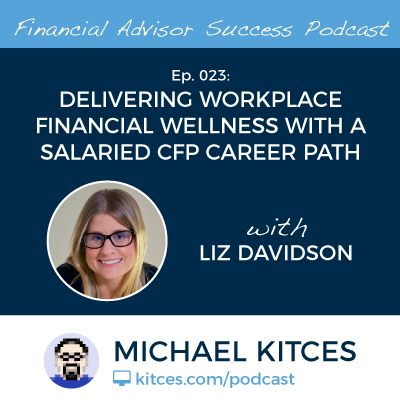 Welcome back to the twenty-third episode of the Financial Advisor Success podcast!
Welcome back to the twenty-third episode of the Financial Advisor Success podcast!
My guest this week is Liz Davidson. Liz is the founder of Financial Finesse, the largest independent provider of workplace financial wellness programs, that leverages CFP professionals to provide financial education and financial coaching to employees in the workplace.
What's fascinating about Liz's firm is that in a world where most financial services providers aim to deliver financial wellness and education as a lead-in to selling a product, or an avenue to build lucrative advisory relationships with the executives and key employees, Financial Finesse is truly dedicated to simply helping employees improve their financial wellness, and is solely paid on a flat-fee basis from employers to provide their services.
In this episode, Liz shares the way that Financial Finesse justifies and demonstrates to employers how paying to improve the financial wellness of employees really does lead to a Return On Investment for the employer by reducing employer costs on everything from employee absenteeism to health care claims, how they reach employees through a combination of an online platform, one-to-many workshops, and one-to-one coaching, and the ways they tried - and failed - to approach the challenge of financial wellness in a direct-to-consumer approach before pivoting to work through employers.
You'll also hear about the incredible business opportunity that Financial Finesse is creating for CFP certificants, who have the chance to earn an $80,000 base salary, plus bonuses that can take them to a six-figure income, simply by providing financial education and coaching to clients, without any obligations for sales, production, or business development - an entirely new channel and career path for expanding the reach of financial planning.
So whether you’ve been curious about the opportunities to deliver your own version of a financial wellness program in the employer channel, or are a CFP looking for ideas on a new career path, or simply want some fresh perspective on new ways that financial planning is being delivered, I hope you enjoy this latest episode of the Financial Advisor Success podcast!

 Welcome back to the twenty-second episode of the Financial Advisor Success podcast.
Welcome back to the twenty-second episode of the Financial Advisor Success podcast.
